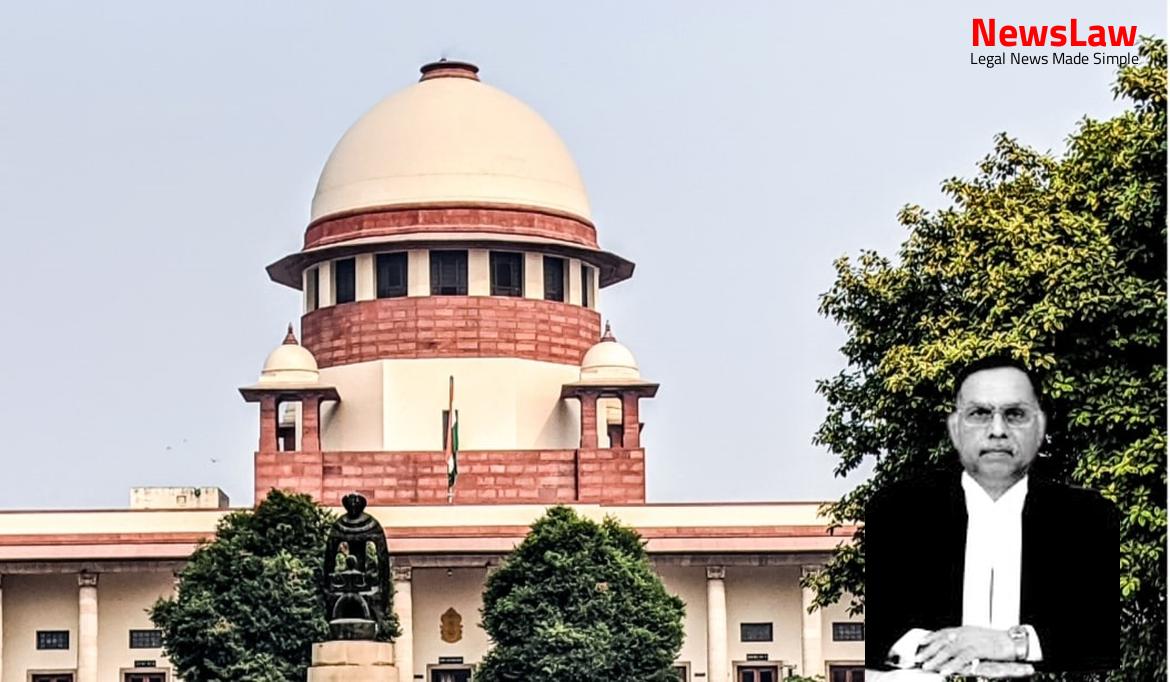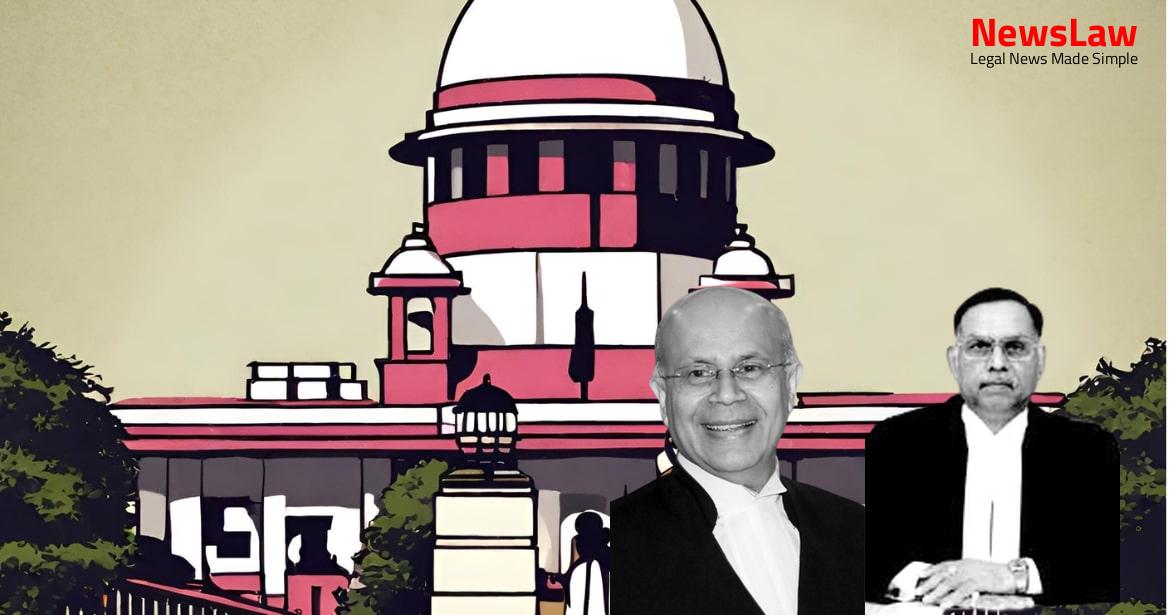Delve into the intricacies of a legal case revolving around land compensation under the Kerala Forest Act. The court’s meticulous legal analysis explores the definitions of ecologically fragile lands, compensation entitlements, and the rights of possession. Stay tuned to unravel the complexities of this notable case.
Facts
- The land subject to the appeal was vested in the Government under the Kerala Private Forest Act, 1971
- The Single Judge allowed the writ petition as allotment of alternative land was not possible
- Adivasis were in possession of part of the land and could not be dispossessed by the State
- The writ petitioners requested restoration of the original land or compensation as assessed by the District Tehsildar
- Correspondences were made regarding the restoration of the land but an alternative proposal for compensation was considered
- The Divisional Forest Officer recommended compensation instead of restoration, which the respondents agreed to
- The land subject to the appeal could not be restored, and alternative proposals for land allotment were made at different places
- The Writ Appeal challenged the direction to pay compensation for the land as per the High Court’s earlier judgment
Also Read: Analysis of Seniority Determination in Armed Forces Personnel Case
Arguments
- The appellants argue that the land in dispute is classified as ecological fragile land under the Kerala Forest (Vesting and Management of Ecologically Fragile Lands) Act, 2003.
- They state that since the respondents are not challenging the vesting under Act, 2003, there should be no direction for compensation.
- The appellants assert that no compensation is payable for land vested in the Government under Section 3(1) of the Act, 2003.
- They argue that even if a notification was validly passed, it does not change the right of the respondents to claim compensation for land that could not be restored by the State.
- The appellants claim that the Act, 2003 is not applicable in this case as the land does not meet the definition of ecologically fragile lands as per Section 2(b)(i) of the Act.
- They further contend that the land in question was cultivated with cardamom and pepper, and not classified as fragile land.
- In response, the respondents refute the appellants’ arguments and assert that the right of possession is a crystallised right.
- They mention that the subject land may not be ecologically fragile but due to a non-challenged notification, compensation need not be discussed further.
- The respondents also refer to an interim order passed by the High Court in favor of Adivasi Vikasana Pravarthaka Samithy, preventing possession to be given to the appellants.
- Referring to Section 8(2) of the Act, 2003, the respondents argue that no compensation is payable for the vesting of ecologically fragile land in the Government.
- As there is no challenge to the notification dated 12.03.2007, the respondents argue that no compensation is payable by the State under Section 8(2).
- They state that the land under cultivation does not qualify as forest land, and a notification dated 03.04.2007 has already been issued under Section 3 of the Act, 2003 resulting in no compensation being payable.
- The respondents claimed their rightful ownership of the land after a prolonged legal battle under Act, 1971.
- They were denied the possession and enjoyment of their property for 45 years due to the custodian’s violation of duty under Section 8 of Act, 1971.
- As the State failed to evict the Adivasis occupying the land, the respondents had to accept compensation instead of restoration of possession.
- The compensation offered by the Tehsildar was considered meagre and inadequate by the respondents.
- The judgment by the learned Single Judge upheld the legitimate rights of the respondents to their land.
Also Read: Analysis of Circumstantial Evidence in Criminal Conviction
Analysis
- The subject land has been declared as ecologically fragile land by a notification issued on 12.03.2007.
- The High Court received communication from the Tehsildar assessing the value of the land at Rs. 1000/- per cent and Rs. 800/- per cent, covered by O.A. No 67 of 1976 and O.A. No.68 of 1975 respectively.
- The order of the Forest Tribunal was overturned, challenging the declaration of the land as ecologically fragile.
- The definition of ‘ecologically fragile lands’ is provided under Section 2(b) of the Act.
- The custodian must inform the landowner in writing about the land’s status and it should be presented to the Advisory Committee under section 15.
- The Government is empowered under Section 4 to declare ecologically fragile land.
- Since the State could not restore possession, two options were suggested: alternative land allotment or compensation.
- The land valuation was carried out by the Tehsildar in this context.
- Despite losing their rights under the 2003 Act, the respondents still have the right to enjoy the land’s possession and yield prior to the enactment of the Act in 2003.
- The respondents were kept out of possession of the land post-1971 due to the State’s claim of ownership under the 1971 Act.
- The notification under the 2003 Act has consequences on the respondents’ claim and possession of the land, impacting their rights and enjoyment.
- All ecologically fragile lands held by any person or any other form of right over them shall be transferred to and vested in the Government.
- The transfer will be free from all encumbrances, and the right, title, and interest of the owner or any other person will be extinguished from the date of commencement of the Act.
- Respondents should be compensated for benefits arising out of the land for the period they were kept out of possession
- No material on record to determine the computation of yield and benefits arising of the land
- Litigation over the land has lasted for 45 years
- Parties need not be sent to another forum for determining compensation
- Compensation of 50% of the value of the land computed by the Tehsildar to be paid to respondents
Also Read: Constitutional Interpretation on Multi-Member Wards in Municipalities
Decision
- 50% of compensation as directed by the learned Single Judge in its judgment dated 19.01.2007 to be paid to the respondents within three months from today.
- Failure to pay within the specified period will result in the respondents being entitled to receive the payment with interest at 7% per annum.
- Parties are to bear their own costs.
- The appeal is partly allowed as per the specified extent.
- The judgments of the learned Single Judge and the Division Bench of the Kerala High Court are modified accordingly.
Case Title: THE CONSERVATOR AND CUSTODIAN OF FOREST Vs. SOBHA JOHN KOSHY . (2021 INSC 75)
Case Number: C.A. No.-000414-000414 / 2021



